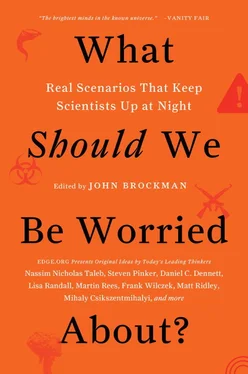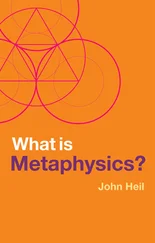Famously, and ironically, the only thing of which we can be truly certain is the existence of our own subjective experience, and we see the physical world only through this dark glass. Yet the scientific method has proved a remarkable tool for clarifying our view and enabling us to develop an elaborate, apparently objective consensus about how the world works. Unfortunately, having provided us with an escape route from our own subjectivity, science leaves us almost completely impotent to probe the nature and origins of subjective experience itself. The truth is that we have no idea what things have consciousness, where it comes from, or even what it is. All we really know is how it feels.
That may sound like an odd statement to come from a former neuroscientist. Certainly we understand an impressive amount about how the brain functions as a physical system, and also about the ways in which different brain states correspond to various reported subjective experiences. But this is a long way from understanding consciousness well enough to be able to do what really matters: determine with reasonable certainty what does and does not possess it, and to what degree.
This is a fabulously hard task. Daniel Dennett’s outstanding book Consciousness Explained , for all its considerable eloquence and erudition, falls well short of the claim of its title. Indeed, we have tied ourselves in such intellectual knots over consciousness that it is hard to discern more than incremental progress since Descartes.
For an example of the difficulties involved, consider John Searle’s celebrated Chinese Room thought experiment, which purports to show—contrary to Alan Turing’s claims—that input-output characteristics alone are insufficient to determine the existence of a conscious mind. Intuitively this conclusion seems right: A sleeping person, immobile and inattentive, might nevertheless be experiencing vivid dreams. Conversely, I can drive a familiar route without forming any conscious record of the journey that took me to my destination. But the Chinese Room does nothing to prove this thesis, for it is a thought experiment, and the trouble with thought experiments is that the researcher chooses not only the experimental conditions but also the results. This makes them useful for testing the internal consistency of ideas but almost useless for probing mysterious, apparently emergent phenomena like consciousness. (To see this, carry out the same thought experiment on the 1.4-kilogram lump of electrophysiological goo called the human brain, and if you’re being consistent you’ll get the same result: There appears to be no conscious understanding anywhere inside.)
Over the last decade or two, neuroscientists have at last shed their qualms about investigating the mysterious and transcendent phenomenon of consciousness, with some interesting results. Our best guess these days is that consciousness arises when certain types and quantities of information are integrated in the brain in certain ways. But this is still very hand-wavy, not only because the parameters are so ill-defined but also because we don’t even know exactly what we mean by “information.” After all, every physical system contains information of one sort or another, and “computes” its own behavior, so the brain is far from unique in this respect.
What’s more, even if we understood exactly what kind of information has to be brought together in precisely what combinations and quantities to ignite a spark of consciousness, we’d still be in the dark as to whether this is an emergent or fundamental phenomenon and why this physical universe even allows subjective experience to exist at all. Those mysteries remain as dark to us as the nature of existence itself.
Toward the end of 2012, doctors picked up the first message (via a brain scan) from a patient in a persistent vegetative state. But if input-output characteristics can’t be trusted—and they probably can’t—then we really have no way of confirming whether this represented a conscious act or an insensible physical response. Similarly, what of patients under anesthetic? For all we know, they may be in agony during their operations even if they have no memory of it afterward. And so on and on, from human embryos to birds, insects, and, yes, even plants. Not to mention all those computers we’re bringing into existence: Might they have an inner life, too?
It is possible that we are rare, fleeting specks of awareness in an unfeeling cosmic desert, the only witnesses to its wonder. It is also possible that we are living in a universal sea of sentience, surrounded by ecstasy and strife that is open to our influence. Sensible beings that we are, both possibilities should worry us.
WILL THERE BE A SINGULARITY WITHIN OUR LIFETIME?
MAX TEGMARK
Physicist, MIT; researcher, precision cosmology; scientific director, FQXi (Foundational Questions Institute)
Although life as we know it gets a lot of flak, I worry that we don’t appreciate it enough and are too complacent about losing it.
As our Spaceship Earth blazes though cold and barren space, it both sustains and protects us. It’s stocked with major but limited supplies of water, food, and fuel. Its atmosphere keeps us warm and shielded from the sun’s harmful ultraviolet rays. Its magnetic field shelters us from lethal cosmic rays. Surely any responsible spaceship captain would make it a top priority to safeguard his craft’s future existence by avoiding asteroid collisions, onboard explosions, overheating, ultraviolet-shield destruction, and premature depletion of ship supplies. Yet our spaceship crew hasn’t made any of these issues a top priority, devoting (by my estimate) less than a millionth of its resources to them. In fact, our spaceship doesn’t even have a captain!
Many have blamed this dismal performance on life as we know it, arguing that since our environment is changing, we humans need to change with it: We need to be technologically enhanced, perhaps with smartphones, smartglasses, brain implants, and ultimately by merging with superintelligent computers. Does the idea of life as we know it getting replaced by more advanced life sound appealing or appalling to you? That probably depends on the circumstances—and in particular on whether you view the future beings as our descendants or our conquerors.
If parents have a child who’s smarter than they are, who learns from them and then goes out and accomplishes what they could only dream of, they’ll probably feel happy and proud, even if they know they can’t live to see it all. Parents of a highly intelligent mass murderer feel differently. We might feel that we have a similar parent-child relationship with future AIs, regarding them as the heirs of our values. It will therefore make a huge difference whether or not future advanced life retains our most cherished goals.
Another key factor is whether the transition is gradual or abrupt. I suspect that few are disturbed by the prospects of humankind gradually evolving, over thousands of years, to become more intelligent and better adapted to our changing environment, perhaps also modifying its physical appearance in the process. On the other hand, many parents would feel ambivalent about having their dream child if they knew it would cost them their lives. If advanced future technology doesn’t replace us abruptly but rather upgrades and enhances us gradually, eventually merging with us, then this might provide both the goal retention and the gradualism required for us to view future technological life-forms as our descendants.
So what will actually happen? This is something we should be really worried about. The Industrial Revolution has brought us machines that are stronger than we are. The Information Revolution has brought us machines that are smarter than we are in certain limited ways, beating us in chess in 2006, on the quiz show Jeopardy! in 2011, and at driving in 2012, when a computer was licensed to drive cars in Nevada after being judged safer than a human. Will computers eventually beat us at all tasks, developing superhuman intelligence?
Читать дальше












